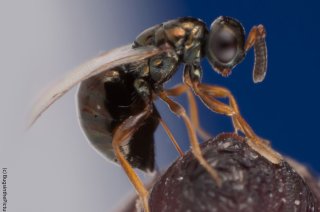
RP13 Genome-based selection for the improvement of natural enemies in biocontrol
This project will seek proof-of-principle for the use of Genome-based-Selection (GS) for key life history and natural enemy traits in the model parasitoid Nasonia vitripennis. GS in biocontrol has great potential since performance and efficacy of natural enemies are difficult to measure, while genetic markers are not.
Intraspecific genetic variation in arthropods is often studied in the context of evolution and ecology. Such knowledge, can also be very usefully applied for selection of genotypes with optimal trait values to develop more effective biocontrol agents. For complex life-history or behavioural traits that lack easily recordable morphological phenotypes (i.e. longevity, development time, fecundity), the selection process can be laborious. Knowledge of the genomic regions underlying the traits can facilitate the screening and selection process. Genome-based selection (GS) methods use information from genome-wide DNA-markers to efficiently select for such complex traits. While they have been shown to hold great potential for plant and animal breeding, GS methods have not yet been applied for the improvement of natural enemies.
In this project, we will seek proof-of-principle for the use of genome-based selection for key life history and natural enemy traits in the model parasitoid Nasonia vitripennis. Genome-based selection techniques will be built that accommodate the haplodiploid nature of parasitoids and other natural enemies. We will generate protocols for insect natural enemies and apply these protocols for the genome-based selection of Nasonia lines for complex life-history traits.